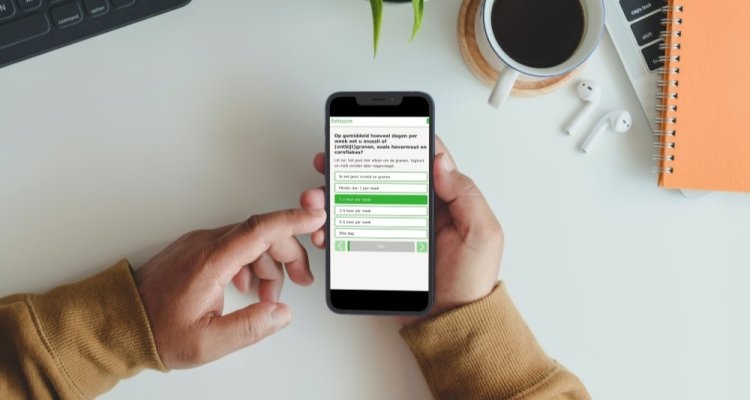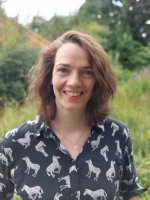When thinking of technology in healthcare, people often immediately think of medical technology. However, the contribution of the universities of technology – with the 4TU.Health centre as the point of contact – goes much further. Technology is not a goal in itself; the universities of technology help to understand challenges, develop solutions and assess capacity and costs. Consider applications in prevention, a healthy built environment, care logistics and sustainability. The 4TU.Health centre encourages collaboration and connection between the parties involved.
Mariska van den Berg, Funding officer at the University of Twente and team member of the 4TU.Health centre: ‘When it comes to technology in healthcare, people often think of a medical device with a plug. But there’s much more to it. As the 4TU.Health centre, we showcase which technologies are developed at the universities of technology and how broadly they can be applied in health and care.
At the same time, we emphasize that technology alone is rarely the solution. A thorough analysis of the problem and careful integration of technology into practice are essential. This sometimes requires policy adjustments, new forms of collaboration and clear financing agreements. We raise awareness around current topics and research and bring parties together to enable cross - domain collaborations. We also highlight to funders and policymakers the versatile applicability of technology in healthcare.’
Healthy nutrition, strong healthcare
‘Healthy nutrition is an example of a topic that, with the help of technology, can be much more deeply embedded in healthcare,’ says Lili Kókai, researcher at the Wageningen University & Research. We aim to achieve this through the ‘Eetscore’: a short, validated online questionnaire that measures how well someone’s eating habits aligns with the Guidelines for healthy eating. The outcome provides insight and personal advice with practical tips for healthier eating. Following the guidelines reduces the risk of disease. Even in the case of existing chronic conditions, healthy nutrition plays a crucial role.’
Together with Rijnstate, Ziekenhuis Gelderse Vallei, UMC Utrecht and Alliantie Voeding in de Zorg Kókai is developing a decision tool for healthcare professionals. Kókai explains: ‘Healthcare professionals often want to discuss the topic of healthy nutrition with patients but lack concrete tools. Our tool will help them provide targeted advice, refer patients or integrate the results into treatment - all based on the Eetscore. The technology is supportive - the key is that dietary advice can be given with confidence in the consultation room.’
Kókai advocates for an environment that encourages healthy choices: ‘The number of people with chronic illnesses is rising. By structurally embedding healthy nutrition in society, healthcare and education, we can ease the pressure on the sector. De universities of technology can help raise awareness of the importance of this topic.’

Collaborating for sustainable healthcare
The universities of technology also help move the healthcare sector forward by working together on sustainable solutions. After all, the environmental impact of the Dutch healthcare system is significant: 7% of CO₂ emissions, 4% of waste and 13% of raw material consumption.
‘Sustainability is not a simple equation,’ says Jan Carel Diehl, Professor at Delft University of Technology. ‘It’s a complex issue involving various stakeholders. The universities of technology provide support by clarifying that complexity and fostering connection. No sustainability challenge has a single solution. Every small change – such as replacing a plastic container with a metal one – must be considered in context. Every change has consequences on multiple levels.’
‘That’s why a sustainable healthcare sector starts with collaboration, Diehl continues. ‘We need a long-term vision, multidisciplinary teams and strong networks. And above all: involving the right partners from the very beginning.’ He advocates for closer collaboration with other universities of technology and with the 4TU.Health centre. ‘We need to accelerate. The 4TU.Health centre can contribute at a systemic level by reflecting on what societal transitions mean for costs, sustainability and the environment. We must integrate sustainability and circularity right from the start of new developments.’
Healthy built environment
In addition to the theme of sustainability, the universities of technology also investigate how the built environment affects people’s health. Professor Helianthe Kort, affiliated with Eindhoven University of Technology and 4TU.centre Built environment has been committed to this for years.
Kort: ‘There are opportunities for improvements at multiple levels that can lead to health gains – from urban planning to residential and office design. In the future, we will need to make the built environment healthier, for example to prevent heat stress in cities and homes. It is also important to sustainably optimize climate control in hospitals, nursing homes and other healthcare institutions (such as those for people with disabilities).’
Kort advocates for cross - disciplinary collaboration: ‘The best ideas often emerge at the intersection of disciplines. Research into how the built environment influences health illustrates this. Consider, for example, the impact of (day)light and air quality on people with dementia. It is essential to engage in dialogue, develop a shared language, collaborate in co - creation and share data. The collaboration between the four universities of technology can play an important role in this.’
Innovative healthcare logistics
This aligns seamlessly with the integrated vision of Erwin Hans, Professor at the University of Twente. According to him, ensuring the sustainability and staffing of future healthcare requires a combination of increased productivity and improved collaboration across all areas.
Together with his research group CHOIR, Hans examines how decisions and capacity can be organized as efficiently as possible. Hans: ‘Technology can ease the pressure on healthcare professionals, reducing the need for personnel capacity. We already have smart solutions for that. The time saved can be used to treat more patients.’
He adds: ‘Healthcare is highly compartmentalized. Within that fragmentation lies a great deal of unused capacity. Real transformation requires all disciplines - they must understand each other’s intersections, respect them and learn to work together. That already begins during education.’
A good example is the research conducted for Neonatale Intensive Care Units (NICU’s). ‘By deploying nurses flexibly across multiple NICU’s, the number of high - risk transports of vulnerable babies can be significantly reduced. It shows what’s possible with shared capacity and collaboration. To truly implement these kinds of innovations, transdisciplinary teams are essential,’ says Hans. ‘We need to make the urgency clear and demonstrate the value that the universities of technology can add.’
Collaboration is key
The various examples make it clear: if we truly want to renew healthcare, we need all disciplines involved. The universities of technology play an essential role in this - not only in the medical technical domain, but especially beyond it. In doing so, they contribute to a future - proof healthcare system that remains affordable and of high quality.
The 4TU.Health centre reinforces this contribution by actively promoting the broad value that the universities of technology offer to healthcare. By connecting researchers, encouraging new collaborations, and engaging in a wide - ranging dialogue about technology, the transdisciplinary approach emerges that healthcare needs in order to innovate.
Discover more
Do you want to learn more about how technology is shaping the future of healthcare? Visit the webpage of the 4TU.Health centre.
Photo credits header photo: Greencycl.
